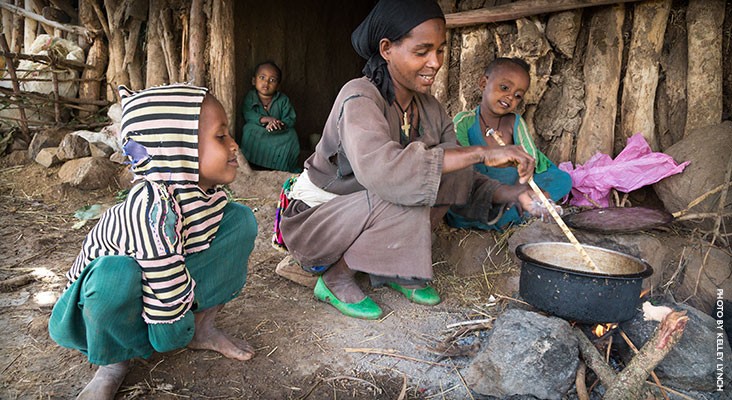Speeches Shim

Malnutrition contributes to more than 50 percent of all infant and child deaths in Ethiopia. The damage caused by malnutrition during the first 1,000 days—from the start of a woman’s pregnancy to her child’s second birthday—is usually irreversible in terms of its negative impact on the child’s health, cognitive development, physical growth, and school and work performance later in life. In Ethiopia, the major causes of malnutrition are persistent food insecurity, poor maternal and child feeding practices, high incidence of infectious diseases, and limited access to quality nutrition services. Household wealth, education, and family planning are also key drivers of children’s nutrition. Twenty-seven percent of women in Ethiopia are thin or malnourished and 38 percent of children suffer from stunting. Ethiopia’s lowland pastoral areas and densely populated, food-insecure highland woredas (districts) suffer frequent droughts, complicating access to and consumption of nutritious foods.
In conjunction with the Feed the Future Initiative and other USAID programs, we are committed to investing in multi-sectoral nutrition programming in Ethiopia, which focuses on good maternal nutrition, optimal breastfeeding, and appropriate complementary feeding to reduce the numbers of stunted children and malnourished women. To keep food safe and families healthy, we educate households about the importance of key hygiene actions. We also invest in agriculture and food systems to improve the availability, accessibility, and consumption of nutritious food. If disaster strikes, we are on the ground with our partners delivering therapeutic foods to reduce the incidents of malnutrition.
USAID also provides technical assistance in developing national policy, programs, guidelines, and improving the quality and access to essential health and nutrition services, and we work with hospitals and health centers in Ethiopia to provide nutritional assessments and counseling support. We enhance nutrition-related activities under the Government of Ethiopia's Productive Safety Net Program (PSNP) with a focus on improving the quality of health services for pregnant and lactating mothers, raising awareness of healthy nutrition practices, improving water and sanitation status of children, and harmonizing activities with the Ethiopian Government's health and nutrition initiatives.
KEY ACTIVITIES
- Feed the Future Ethiopia’s Growth through Nutrition project is our flagship multi-sector nutrition and water, sanitation and hygiene project, which aims to improve the nutritional status of women, young children, and adolescents in its four regions of Ethiopia. The project focuses on improving early childhood nutrition during the first 1,000 days, from pregnancy through a child’s second birthday, recognized as the critical window of opportunity for a child’s growth and development.
- USAID’s Development Food Security Assistance Program (DFSA) and support to Ethiopia’s Productive Safety Net Program improves the nutritional status of targeted communities with a focus on improving the quality of health services for pregnant and lactating mothers, raising awareness on healthy practices, and developing the capacity of health extension workers. Through our partners, USAID is supporting nutrition-related activities to reach food insecure households under the Productive Safety Net Program. These activities seek to improve the nutritional status of targeted communities with a focus on improving the quality of health and nutrition services for pregnant and lactating mothers, as well as for children. Our DFSA initiatives also provide nutritious food to mothers and children, raise awareness of healthy nutrition practices, improve water, sanitation and hygiene, develop the capacity of health extension workers, and support community-based management of acute malnutrition in collaboration with the Ethiopian Government.
- The Feed the Future Ethiopia Value Chain Activity contributes to the Government of Ethiopia’s objective to improve agricultural productivity and commercialization of smallholder farmers. It emphasizes increasing nutrition-sensitive productivity of targeted value chains with a focus on inclusion of women and youth, and helps link smallholder farmers and agribusinesses to buyers and opportunities for greater income generation and trade potential, while also expanding access to credit, technology, information, training, and leadership opportunities.


Comment
Make a general inquiry or suggest an improvement.